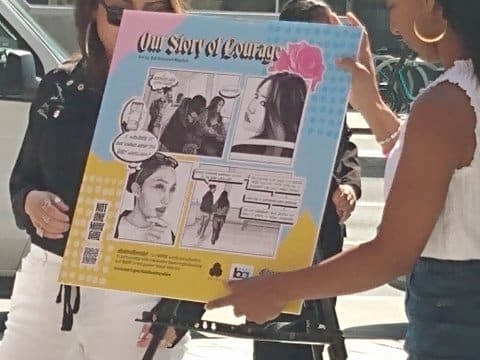
01 Sep BART Launches Second Phase of ‘Not One More Girl’ Campaign Against Sexual Harassment

BART and its partners unveiled posters Aug. 31 in Berkeley to educate the public about sexual harassment and gender-based violence. (Keith Burbank / Bay City News)
By Keith Burbank
Bay City News
BART wants to end sexual harassment of girls and gender-based violence on its transit system and on Thursday in Berkeley the agency kicked off the second phase of a campaign to do so.
This second phase of the Not One More Girl campaign is focused on empowering riders in harassment situations and providing tools to support them when harassment does occur.
BART is changing too to make the system safer for girls and gender-expansive youth as part of the campaign themed Our Story of Courage.
“However you identify, we are here to protect you,” BART’s chief spokesperson Alicia Trost said at a news conference Thursday morning outside of the Downtown Berkeley BART station.
She said this is the most important initiative ever taken by BART.
The second phase of it comes after the COVID-19 pandemic decimated ridership and as BART does everything it can to win riders back.
Trost said, “That starts with safety.”
She said the Not One More Girl campaign is essential to the system’s future because sexual harassment and gender-based violence are keeping youth from riding BART.
Trost spoke with youth in Oakland and at the University of California at Berkeley and was humbled by what she heard, she said.
“Some of them told me, ‘I don’t ride BART. My mom won’t let me,’ ” Trost added, indicating the problem is becoming generational.
BART made some progress in phase one of the campaign. Nine percent of riders said they experienced sexual harassment last month on BART. That is down from 12% when the campaign started.
Girls told BART officials that they don’t feel safe on empty trains. They are fearful when a man sits next to them when there are other open seats.
>>>Read: Lawmaker Introduces Effort to Make Public Transit Safer
Girls don’t feel safe waiting on a platform for 30 minutes. They don’t feel safe at the end of platforms, which are dark and sketchy, the girls told BART officials.
So, BART is making some changes starting Sept. 11. BART will run shorter trains especially on nights and weekends. That means the first car where the train operator works will not be at the end of the platform.
BART is also increasing the frequency of trains on nights and weekends, so girls and other youth don’t have to wait so long.
“Active spaces are safe spaces,” Trost said.
BART officials decided against designating cars as women-only, which some transit agencies around the world do. Instead, BART is encouraging girls and youth and anyone who doesn’t feel safe to ride in the first car.
Sexual harassment is prohibited on BART following a change in policy in phase one of the Not One More Girl campaign, which launched in 2021.
As part of the campaign, BART has put up posters telling people about the steps they can take if they are harassed or witness harassment. Sixty posters have been placed on trains and 300 more are in stations in the system.
BART also created business-size cards that a victim or potential victim can give to another person to ask for help. Cards for bystanders are also available to give to victims to let them know someone is there to help.
The campaign is a collaboration between BART, the Betti Ono Foundation, which builds power through culture, and the Unity Council‘s Latina Mentorship and Achievement Program.
Copyright © 2023 Bay City News, Inc. All rights reserved. Republication, rebroadcast or redistribution without the express written consent of Bay City News, Inc. is prohibited. Bay City News is a 24/7 news service covering the greater Bay Area.






No Comments